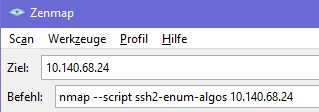Discover the used SSHv2 algorithms/cipher suite using nmap or zenmap can be done using the follwing nse-script and steps:
URL: https://nmap.org/nsedoc/scripts/ssh2-enum-algos.html
Download: https://svn.nmap.org/nmap/scripts/ssh2-enum-algos.nse
Howto Use Guide
-
Download NSE-Script
- Save nse-script-file into your
...\NMap\Scripts\ folder
- Run nmap or zenmap and the command:
nmap --script ssh2-enum-algos *your-target*
Example Output
Starting Nmap 7.80 ( https://nmap.org ) at 2021-07-03 21:18 Mitteleuropäische Zeit
Nmap scan report for 10.140.68.24
Host is up (0.016s latency).
Not shown: 997 filtered ports
PORT STATE SERVICE
22/tcp open ssh
| ssh2-enum-algos:
| kex_algorithms: (10)
| curve25519-sha256
| curve25519-sha256@libssh.org
| ecdh-sha2-nistp256
| ecdh-sha2-nistp384
| ecdh-sha2-nistp521
| diffie-hellman-group-exchange-sha256
| diffie-hellman-group16-sha512
| diffie-hellman-group18-sha512
| diffie-hellman-group14-sha256
| diffie-hellman-group14-sha1
| server_host_key_algorithms: (5)
| rsa-sha2-512
| rsa-sha2-256
| ssh-rsa
| ecdsa-sha2-nistp256
| ssh-ed25519
| encryption_algorithms: (6)
| chacha20-poly1305@openssh.com
| aes128-ctr
| aes192-ctr
| aes256-ctr
| aes128-gcm@openssh.com
| aes256-gcm@openssh.com
| mac_algorithms: (10)
| umac-64-etm@openssh.com
| umac-128-etm@openssh.com
| hmac-sha2-256-etm@openssh.com
| hmac-sha2-512-etm@openssh.com
| hmac-sha1-etm@openssh.com
| umac-64@openssh.com
| umac-128@openssh.com
| hmac-sha2-256
| hmac-sha2-512
| hmac-sha1
| compression_algorithms: (2)
| none
|_ zlib@openssh.com
Author: Kris Katterjohn
License: Same as Nmap--See https://nmap.org/book/man-legal.html




